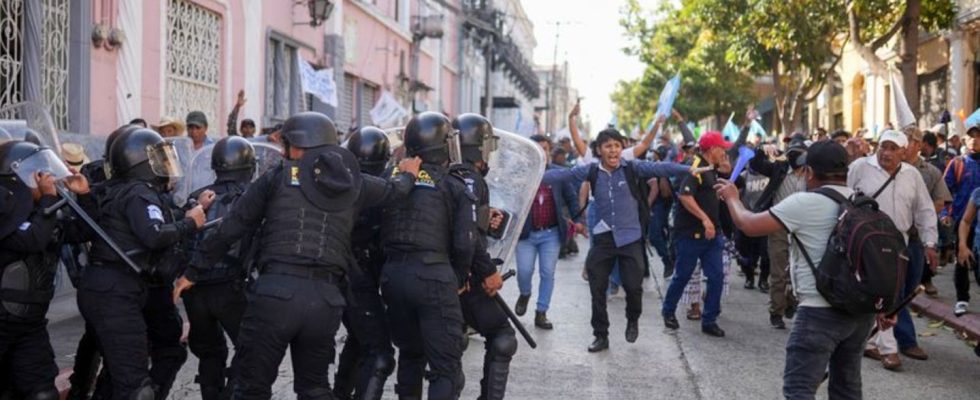Government
Guatemala’s President Arévalo sworn in after delays
Police try to hold back supporters of Guatemala’s elected President Arévalo as they protest outside Congress in Guatemala City against a delay in the start of the legislative session. photo
© Santiago Billy/AP
The newly elected president was actually supposed to be sworn in on Sunday afternoon. But internal disputes arose. Some judges had already tried to prevent him from taking office.
Despite massive resistance from influential circles and After last-minute delays, social democrat Bernardo Arévalo took office as the new president of Guatemala amid tensions.
After months of attempts by his opponents, especially from the judiciary, to prevent the transfer of power, Arévalo took the oath of office as the successor to the conservative head of state Alejandro Giammattei just minutes after midnight local time (07:00 CET) on Monday.
Inauguration delayed by several hours
Internal disputes and formalities in Congress had delayed the inauguration, originally planned for Sunday afternoon, by several hours. Demonstrators therefore threatened to storm the congress building, as local media reported. “People are trying to undermine democracy through illegality, trivialities and abuse of power,” wrote Arévalo on the online platform X, formerly Twitter.
Foreign delegations that traveled to Guatemala City for the change of government had called on Congress not to prevent Arévalo’s inauguration. The will of the people expressed at the ballot box must be respected, said Secretary General of the Organization of American States (OAS), Luis Almagro.
Surprising election success
65-year-old Bernardo Arévalo is the son of the country’s first democratically elected president, Juan José Arévalo (1945-1951). He has promised to fight widespread corruption in Guatemala. Since the former diplomat’s surprise election victory last August, the attorney general’s office and some judges have tried to annul the elections and prevent Arévalo from taking office.
The European Union on Friday threatened sanctions against individuals and organizations that undermine democracy and the peaceful transition of government in Guatemala. Around 300 people have already had their US visas revoked for undermining democracy.
Guatemala is the most populous country in Central America with 17 million inhabitants. The presidential term is four years.

